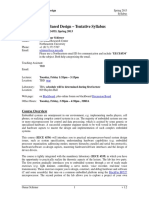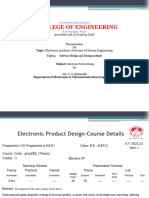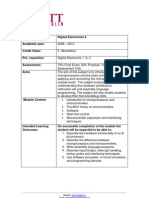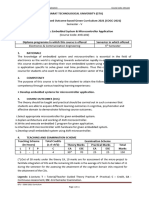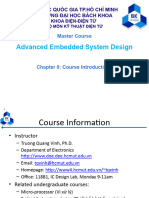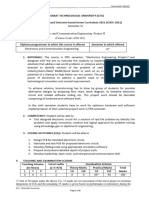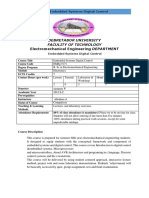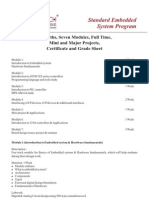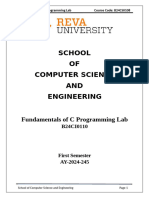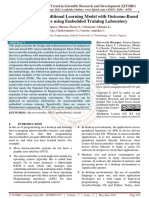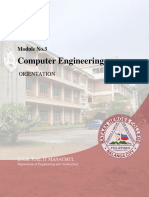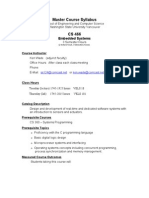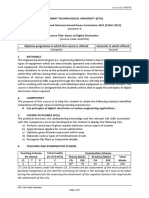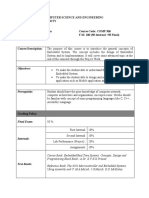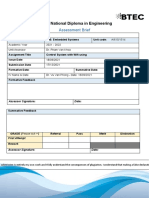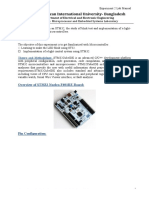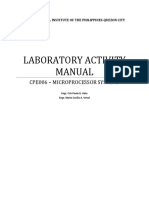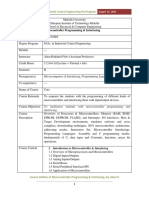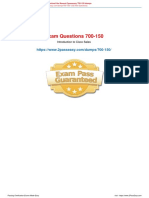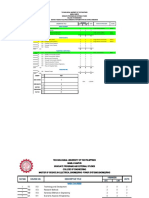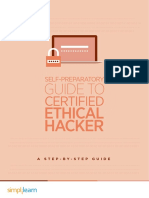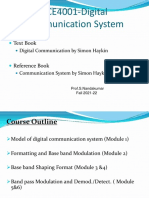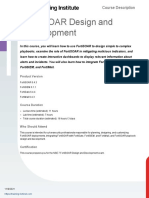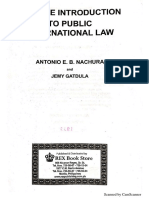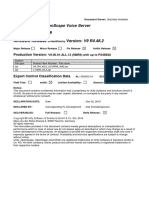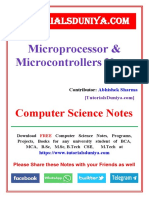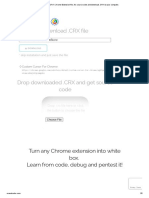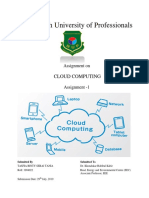3453 Scope
3453 Scope
Uploaded by
Gluvenis L.Copyright:
Available Formats
3453 Scope
3453 Scope
Uploaded by
Gluvenis L.Original Description:
Original Title
Copyright
Available Formats
Share this document
Did you find this document useful?
Is this content inappropriate?
Copyright:
Available Formats
3453 Scope
3453 Scope
Uploaded by
Gluvenis L.Copyright:
Available Formats
Electrical and Electronic Engineering Programme Board
Full-time / Part-time Day / Part-time Evening Higher Diploma in Computer and Electronic Engineering
(EG114403 / EG314403 / EG524403)
Module Syllabus
Module Title Computer Programming for Microcontroller
Module Code EEE3453
QF Credits 10
QF Level 3
Contact Hours: 39 (for full-time pre-employment)
(Lecture: 0; Tutorial: 0; Lab/Workshop: 39)
39 (for part-time in-service)
(Lecture: 0; Tutorial: 0; Lab/Workshop: 39)
Notional Learning
100
Hours Self-study Hours: 61 (for full-time pre-employment)
61 (for part-time in-service)
Assessment Hours: 0
(Outside Contact/Self-study Hours)
Module Intended Learning Outcomes:
On completion of the module, learners are expected to be able to:
1. select appropriate development tools of microcontroller system;
2. employ a general programming language to perform simple I/O tasks in microcontroller system;
3. perform simple microcontroller interfacing with peripheral components;
4. test and debug microcontroller programs in a simulated environment.
Volume B - Module Syllabuses 2-67
Electrical and Electronic Engineering Programme Board
Full-time / Part-time Day / Part-time Evening Higher Diploma in Computer and Electronic Engineering
(EG114403 / EG314403 / EG524403)
Learning Contents and Indicative Contact Hours:
Learning Contents Indicative Contact
Hours
1. Basic architectures of hardware and software components in 6 hours
microcontroller systems
• Describe the basic architectures and block diagrams of essential
microcontroller systems
• Identify basic hardware components of microcontroller systems
• Describe the functions of software development kits and
programming languages of embedded system of the microcontroller
2. Programming of microcontroller system 12 hours
• Identify the components and tools of integrated development
environment (IDE)
• Explain the concepts of compilation of executables
• Edit and compile the microcontroller program with the IDE
according to the task specification
• Debug microcontroller programs
3. I/O interface components for microcontroller system 12 hours
• Identify typical I/O devices and microcontroller peripherals
• Perform I/O programming for simple interfacing tasks
4. Microcontroller simulators to verify programs of simple applications 9 hours
• Employ microcontroller simulators to execute the software in
different simulated hardware environments
• Perform standard verification process by microcontroller simulators
Mapping of Learning Contents with Module Intended Learning Outcomes:
Module Intended Learning Outcomes
Learning Contents
1 2 3 4
Basic architectures of hardware and
1 software components in ü
microcontroller systems
Programming of microcontroller
2 ü ü ü
system
I/O interface components for
3
microcontroller system
ü ü ü
Microcontroller simulators to verify
4 ü ü
programs of simple applications
Volume B - Module Syllabuses 2-68
Electrical and Electronic Engineering Programme Board
Full-time / Part-time Day / Part-time Evening Higher Diploma in Computer and Electronic Engineering
(EG114403 / EG314403 / EG524403)
Learning and Teaching Strategies:
• The module is delivered in computer laboratory, in which class activities are inter-mixed
with lecture, demonstration and hands-on exercises to help student to grasp a clear concept
of C programming, I/O devices, embedded systems, mobile app and web-based GUI.
• Students will have ample opportunities to practice their programming skills on arithmetic,
logical and input/output through hands-on exercises and workshops.
• Software simulator and in-circuit emulator are employed for students to master the
microcontroller operating techniques.
• Assignments are arranged at suitable intervals throughout the semester. Student progress is
continuously monitored and feedback are provided to enhance the module learning
outcomes.
• Case studies of industry applications are discussed in the class to enhance students’
knowledge of the wide applications of microcontroller in the electronic or other industries.
• Laboratory work, assignments and end-of-module assessment at suitable intervals
throughout the module are employed to monitor the progress of the students.
• ESP programming will be included as a practical example.
Assessment Scheme:
Continuous Assessment (CA) 50%
End-of-Module Assessment (EA) 50%
Total 100%
Requirements for Supporting Tools:
(a) CodeBlock, Microsoft Visual Studio, or another C debugger and builder etc.
(b) Arduino Simulator and Arduino IDE
References:
c Purdum, J., & King, T. (2015). Beginning C for Arduino: Learn C Programming for the
Arduino.
2. Bayle, J., ProQuest, & ProQuest CSA. (2013). C programming for
Arduino (Community experience distilled). Birmingham: Packt Pub.
3. Geddes, M. (2017). Arduino Project Handbook : 25 Simple Electronics Projects for
Beginners, Volume 2.
4. Andrews, W. (2017). Arduino Playground : Geeky Projects for the Experienced Maker.
Creation/Revision Record:
Version Date Created/Revised by
1 16 Jan 2019 Mr. Yu Tsz-Tat, Arthur
Volume B - Module Syllabuses 2-69
You might also like
- The Open University of Sri LankaDocument11 pagesThe Open University of Sri LankaSumith PereraNo ratings yet
- Northeastern UniversityDocument4 pagesNortheastern UniversityJaimeRMichilenaNo ratings yet
- EE445-ABET Form - Course OutlineDocument3 pagesEE445-ABET Form - Course OutlineRaya AwadNo ratings yet
- Epd U3Document102 pagesEpd U3divyajhoshi5No ratings yet
- Media, 19031, enDocument1 pageMedia, 19031, enkolhejayantNo ratings yet
- Embedded System & Microcontroller Application Course Code: 4351102Document8 pagesEmbedded System & Microcontroller Application Course Code: 4351102Raggy TannaNo ratings yet
- Unit 46 Assignment Embedded SystemsDocument7 pagesUnit 46 Assignment Embedded SystemsHeba AzizNo ratings yet
- AVR Short Course PDFDocument4 pagesAVR Short Course PDFENo ratings yet
- AESD Ch0Document15 pagesAESD Ch0TRƯỜNG NGUYỄN XUÂNNo ratings yet
- 314Document5 pages314letanbaospkt06No ratings yet
- Course Code: 4361103: Page 1 of 8Document8 pagesCourse Code: 4361103: Page 1 of 8rashmin tannaNo ratings yet
- 15EC62 Arm MC and Es Course File 2018Document10 pages15EC62 Arm MC and Es Course File 2018Nikhil KulkarniNo ratings yet
- The Open University of Sri LankaDocument3 pagesThe Open University of Sri LankaSumith PereraNo ratings yet
- BMS Institute of Technology PDFDocument53 pagesBMS Institute of Technology PDFKaruna nidhan tiwari ECE-2016-20No ratings yet
- Digital Control &mbadded SystemDocument4 pagesDigital Control &mbadded SystemabrahamNo ratings yet
- Standard Embedded System ProgramDocument6 pagesStandard Embedded System Programmukesh.33No ratings yet
- CzernikowskiVallino WCAE2005Document7 pagesCzernikowskiVallino WCAE2005Arunmetha SundaramoorthyNo ratings yet
- ECE 521: Microprocessor SystemDocument12 pagesECE 521: Microprocessor SystemAmar MursyidNo ratings yet
- Subject Outline - 48434Document11 pagesSubject Outline - 48434Hussein RizkNo ratings yet
- 2024-Updated As Per Rules-C Programming Lab ManualDocument58 pages2024-Updated As Per Rules-C Programming Lab Manualamitkiresur43No ratings yet
- Faculty of Electrical Engineering: Program OutcomesDocument3 pagesFaculty of Electrical Engineering: Program OutcomesPeter ParksonNo ratings yet
- Activity No 1 - Setting Up and Programming Controllers-1Document6 pagesActivity No 1 - Setting Up and Programming Controllers-1RUEL ALEJANDRONo ratings yet
- COMSYLA Course Syllabus Sy06072ndDocument4 pagesCOMSYLA Course Syllabus Sy06072ndnskprasad89No ratings yet
- Week 1 and SyllabusDocument10 pagesWeek 1 and Syllabuslhdcastro2No ratings yet
- SE LAB MANUAL (MallaReddy&Radhika) - FinalDocument52 pagesSE LAB MANUAL (MallaReddy&Radhika) - FinalDeepshikha Mehta joshiNo ratings yet
- Laboratory Manual: ELE-203 Digital Logic DesignDocument73 pagesLaboratory Manual: ELE-203 Digital Logic DesignMoiz MazharNo ratings yet
- Course Description CP Eng 214 - Digital Engineering Lab II: Manual, Barnes and Noble Custom Publishing Series, 2001Document2 pagesCourse Description CP Eng 214 - Digital Engineering Lab II: Manual, Barnes and Noble Custom Publishing Series, 2001Zunnur AimanNo ratings yet
- Course PlanDocument5 pagesCourse PlanRaja AsainalNo ratings yet
- Profile AnishChauhanDocument3 pagesProfile AnishChauhananis_chauhanNo ratings yet
- 6TH Semester MP Lab Manual 2017 - 3 PDFDocument85 pages6TH Semester MP Lab Manual 2017 - 3 PDFAman SrivastavNo ratings yet
- Re Engineering Traditional Learning Model With Outcome Based Learning Curve Using Embedded Training LaboratoryDocument11 pagesRe Engineering Traditional Learning Model With Outcome Based Learning Curve Using Embedded Training LaboratoryEditor IJTSRDNo ratings yet
- ECE279 - Zero - Lecture - 2023 - UpdatedDocument31 pagesECE279 - Zero - Lecture - 2023 - Updatedkofineg493No ratings yet
- Computer Engineering Orientation - Module 03Document8 pagesComputer Engineering Orientation - Module 03Joel ManacmulNo ratings yet
- DSI - TP 1515-1516 Microcontroller Development Systems - en (Screen)Document4 pagesDSI - TP 1515-1516 Microcontroller Development Systems - en (Screen)Zain NertaNo ratings yet
- Digital Design Lab ManualDocument39 pagesDigital Design Lab ManualDhananjayaNo ratings yet
- ME01062021 (1)Document3 pagesME01062021 (1)07-Darshilsinh ChavdaNo ratings yet
- ES Lab ManualDocument117 pagesES Lab ManualSri JalakamNo ratings yet
- EE471L EE18 OutlineDocument2 pagesEE471L EE18 OutlineEhsan IlyasNo ratings yet
- IT5103 Graphics Gaming TechnologiesDocument8 pagesIT5103 Graphics Gaming TechnologiesIT2025Chinmay KamlaskarNo ratings yet
- Master Course Syllabus: Embedded SystemsDocument5 pagesMaster Course Syllabus: Embedded SystemsFred DoanNo ratings yet
- Basics of Digital Electronics Course Code: 4320703Document9 pagesBasics of Digital Electronics Course Code: 4320703MohitNo ratings yet
- Department of Computer Science and Engineering Kathmandu UniversityDocument4 pagesDepartment of Computer Science and Engineering Kathmandu UniversityAcharya SuyogNo ratings yet
- Higher National Diploma in Engineering: Assessment BriefDocument4 pagesHigher National Diploma in Engineering: Assessment Briefvan hangNo ratings yet
- Maes Mid Lab Exp-2 StudentDocument5 pagesMaes Mid Lab Exp-2 Studentwahid sadikNo ratings yet
- DDCO Lab ManualDocument76 pagesDDCO Lab ManualOliver Ryan FernandesNo ratings yet
- Aditya Institute of Technology and Management: TekkaliDocument64 pagesAditya Institute of Technology and Management: Tekkalichalapathit520No ratings yet
- MENG 313 C.Specification - ByLaw 2007Document6 pagesMENG 313 C.Specification - ByLaw 2007Eman AhmedNo ratings yet
- Manual Cpe006Document57 pagesManual Cpe006ALlan ABiangNo ratings yet
- ASEE-GSW 2015 Submission 53Document7 pagesASEE-GSW 2015 Submission 53rasyoung5302No ratings yet
- Unit 1Document57 pagesUnit 1Ayush ChamatNo ratings yet
- Lab 02Document7 pagesLab 02daniyal2k23No ratings yet
- MPDSP LabDocument69 pagesMPDSP Labsrc e-solutions100% (1)
- Computer NW Lab ManualDocument24 pagesComputer NW Lab ManualjupitersamirNo ratings yet
- Microcontroller OutlineDocument3 pagesMicrocontroller OutlineGuesh GebrekidanNo ratings yet
- Lab SyllabusDocument5 pagesLab SyllabusAFEEFA RAFEEQUENo ratings yet
- Guru Nanak Institutions Technical Campus (Autonomous) : Ibrahimpatnam, R R District - 501 506 (T.S.)Document63 pagesGuru Nanak Institutions Technical Campus (Autonomous) : Ibrahimpatnam, R R District - 501 506 (T.S.)kheshavyadav698No ratings yet
- Digital Design and Computer Organization - BCS302 - LAB MANUALDocument67 pagesDigital Design and Computer Organization - BCS302 - LAB MANUALZaidaanShiraz50% (6)
- C Programming for the PIC Microcontroller: Demystify Coding with Embedded ProgrammingFrom EverandC Programming for the PIC Microcontroller: Demystify Coding with Embedded ProgrammingNo ratings yet
- Intermediate C Programming for the PIC Microcontroller: Simplifying Embedded ProgrammingFrom EverandIntermediate C Programming for the PIC Microcontroller: Simplifying Embedded ProgrammingNo ratings yet
- Transcript2022jan26 BTCES 2017 81395Document4 pagesTranscript2022jan26 BTCES 2017 81395duke otukeNo ratings yet
- Exam Questions 700-150: Introduction To Cisco SalesDocument9 pagesExam Questions 700-150: Introduction To Cisco SalesDmitrii DaniliukNo ratings yet
- Engr Cherry Pascion Bsece Engr. Jayvee Gagan Bsce Engr Cherry Pascion BseceDocument5 pagesEngr Cherry Pascion Bsece Engr. Jayvee Gagan Bsce Engr Cherry Pascion BseceStephen Velasco VillaruzNo ratings yet
- Acs580Mv: Notes For Drivestartup LicenseDocument4 pagesAcs580Mv: Notes For Drivestartup LicenseSanu YoNo ratings yet
- Aruba Lab-5-2Document5 pagesAruba Lab-5-2malekNo ratings yet
- Learn Python 3 - Control Flow Cheatsheet - CodecademyDocument5 pagesLearn Python 3 - Control Flow Cheatsheet - Codecademyproject workNo ratings yet
- Design and Management of Information Systems For Purbasha: Submitted By: Group 10, Section ADocument31 pagesDesign and Management of Information Systems For Purbasha: Submitted By: Group 10, Section ADevesh ShahNo ratings yet
- Abhay Pratap Singh: #305, Flat No. B3, Sai Accomodation, Bellandur, Bengaluru Karnataka - 560103Document2 pagesAbhay Pratap Singh: #305, Flat No. B3, Sai Accomodation, Bellandur, Bengaluru Karnataka - 560103Abhay lNo ratings yet
- Ps Pulse 5.1 Error MsgsDocument40 pagesPs Pulse 5.1 Error MsgsMohamed AliNo ratings yet
- Tankinhoudmeetsysteem - AdBlue - Telemetrie - Yara - IDAx11 - Air1 ConfigurationDocument10 pagesTankinhoudmeetsysteem - AdBlue - Telemetrie - Yara - IDAx11 - Air1 ConfigurationmariéNo ratings yet
- Techtalks Recruitment: Software Developer Embedded Software Test EngineerDocument1 pageTechtalks Recruitment: Software Developer Embedded Software Test EngineerQuốc BảoNo ratings yet
- CEH eBOOK 2Document10 pagesCEH eBOOK 2Ravi Teja SikhakolliNo ratings yet
- 01 - Azure Monitor Data PlatformDocument4 pages01 - Azure Monitor Data PlatformLucas Mendes Pereira100% (2)
- ECE4001-Digital Communication System: Text BookDocument51 pagesECE4001-Digital Communication System: Text BookvamshiNo ratings yet
- IT Cyber Security Awareness - 2020Document22 pagesIT Cyber Security Awareness - 2020JOHANNES RICKY SNo ratings yet
- QR Code Attendance Monitoring System With Sms Notification: Pamantsan NG Lungsod NG MarikinaDocument6 pagesQR Code Attendance Monitoring System With Sms Notification: Pamantsan NG Lungsod NG Marikinajenny adlaoNo ratings yet
- FortiSOAR Design and Development 6.4 Course DescriptionDocument2 pagesFortiSOAR Design and Development 6.4 Course DescriptioncalvosanzNo ratings yet
- GV500MA @track Air Interface Protocol R2.00Document169 pagesGV500MA @track Air Interface Protocol R2.00akira freitasNo ratings yet
- Pil by Nachura Bookpdf PDF FreeDocument261 pagesPil by Nachura Bookpdf PDF FreeFrancisco AbuyenNo ratings yet
- OpenScape Voice Server V9R4.48.2 Release Notes V1.0 InternalDocument39 pagesOpenScape Voice Server V9R4.48.2 Release Notes V1.0 Internaldinesh SangamNo ratings yet
- CNCF Cloud Native Security Whitepaper Nov2020Document44 pagesCNCF Cloud Native Security Whitepaper Nov2020Yanhan TangNo ratings yet
- Lossless Data Compression Algorithm Abraham Lempel Jacob Ziv Terry Welch LZ78Document9 pagesLossless Data Compression Algorithm Abraham Lempel Jacob Ziv Terry Welch LZ78rlnandha_2006No ratings yet
- Microprocessors NotesDocument78 pagesMicroprocessors NotesShashi pratap SinghNo ratings yet
- RRLS Developing A Web Application For Online Class Purposes Using HTML CSS and JavaScript Languages ICT 201Document7 pagesRRLS Developing A Web Application For Online Class Purposes Using HTML CSS and JavaScript Languages ICT 201Marxel AbogadoNo ratings yet
- 00-Installations - Rev GDocument69 pages00-Installations - Rev GROHAN MOHAPATRANo ratings yet
- 137 - CS8792, CS6701 Cryptography and Network Security - 2 Marks With Answers 2Document17 pages137 - CS8792, CS6701 Cryptography and Network Security - 2 Marks With Answers 2Lionel Bharath RazerNo ratings yet
- Get .CRX Chrome Extension File, It's Source Code and Download .CRX To Your ComputerDocument5 pagesGet .CRX Chrome Extension File, It's Source Code and Download .CRX To Your ComputerMohammed EzzatNo ratings yet
- Dashboard in ExceDocument26 pagesDashboard in ExceJobaerNo ratings yet
- Tinyproxy Vs Squid Which Proxy Server Is BetterpmuyehzoquDocument3 pagesTinyproxy Vs Squid Which Proxy Server Is Betterpmuyehzoqupantryhandle39No ratings yet
- Bangladesh University of Professionals: Cloud ComputingDocument9 pagesBangladesh University of Professionals: Cloud ComputingMD Monowar Ul IslamNo ratings yet

